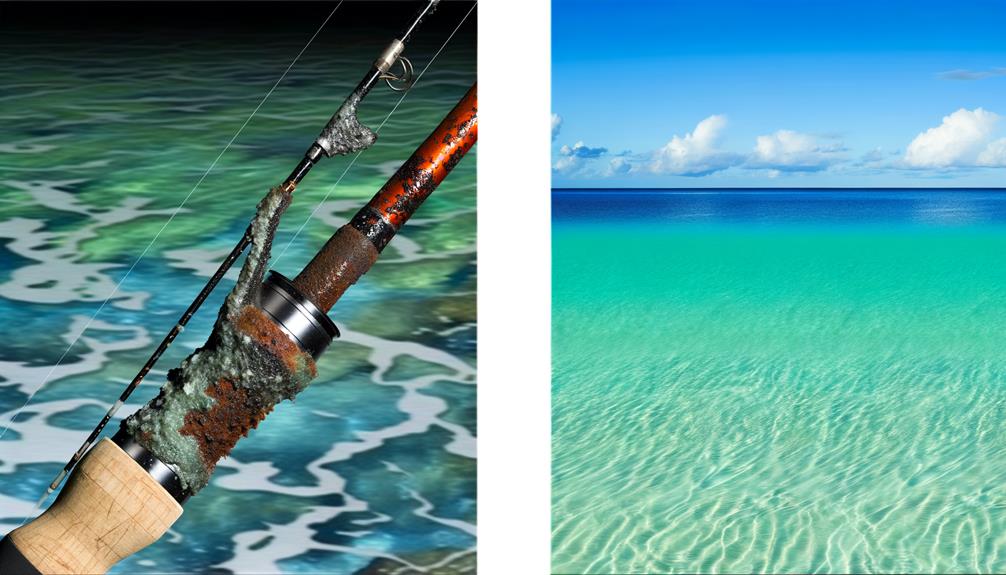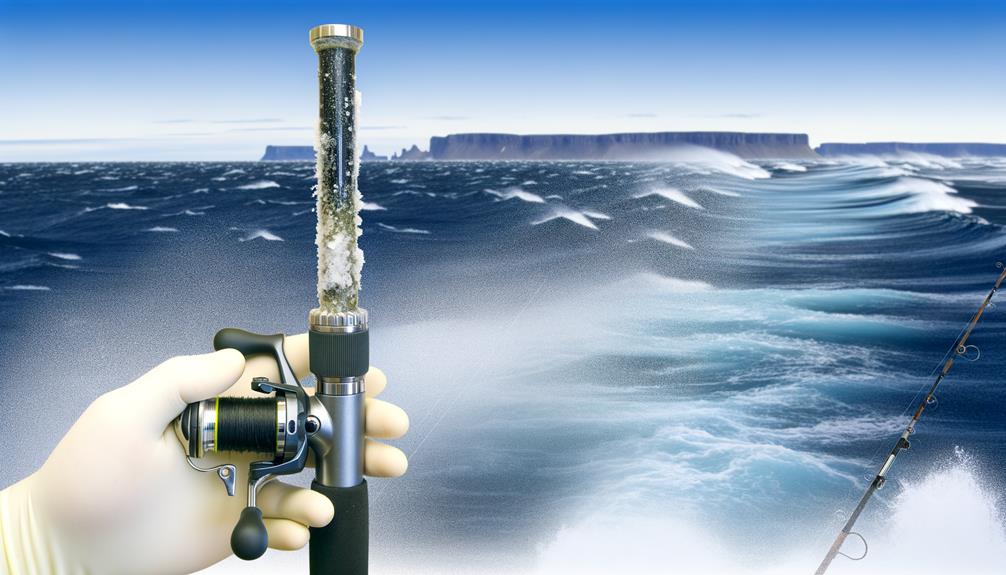The debate surrounding the use of freshwater fishing rods in saltwater has been a topic of interest among fishing enthusiasts and professionals for some time.
The inherent differences in construction materials, design elements, and maintenance requirements between these two types of rods raise several critical questions. Notably, can one, in fact, effectively utilize a freshwater fishing rod in a saltwater environment without compromising its longevity and performance?
Even more importantly, what steps can one take to mitigate any potential damage or degradation that may occur as a result?
These unanswered questions provide a compelling basis for further exploration and discussion.
Key Takeaways
- Freshwater rods can be used in saltwater, but they lack the corrosion resistance of saltwater rods and may have a reduced lifespan.
- Saltwater-specific rods offer optimal performance and durability due to their corrosion-resistant materials.
- Dual-purpose rods provide versatility for both freshwater and saltwater fishing, but may require more maintenance.
- Regular cleaning and maintenance, such as rinsing with fresh water and soap, are crucial when using freshwater rods in saltwater.
Understanding Freshwater Fishing Rods
In the realm of angling, freshwater fishing rods are specifically designed for use in low-salinity environments. These rods feature components like guides and reel seats made from materials such as aluminum oxide, which can be prone to corrosion in saltwater conditions. As a result, using freshwater rods in saltwater settings can significantly shorten their lifespan.
The design of freshwater rods is tailored to the characteristics of freshwater bodies, with a focus on materials that may lack corrosion resistance. Guides and reel seats, crucial for line control and reel attachment, are particularly vulnerable to corrosion in saltwater. To maintain the integrity and functionality of freshwater rods over time, meticulous maintenance practices, including thorough rinsing and drying after each use, are essential.
For optimal performance and longevity, it is advisable to use rods specifically engineered for saltwater fishing when angling in such environments. This proactive approach not only protects the angler's investment but also ensures a satisfying angling experience by preserving the equipment's durability and functionality.
Characteristics of Saltwater Fishing Gear
Given the challenges posed by saltwater environments, it is crucial to consider the specific characteristics of saltwater fishing gear, which is uniquely designed to withstand these conditions. A salient feature of saltwater rods is their construction with corrosion-resistant materials like titanium and stainless steel, which provide durability and longevity in harsh saltwater conditions.
Unlike a Freshwater Rod, saltwater rods are typically thicker, heavier, and longer. This is necessary to handle larger fish species and facilitate longer casting distances common in saltwater angling. Moreover, these characteristics provide the structural strength needed when battling the pull of larger, more powerful fish.
Graphite rods are highly favored in saltwater fishing due to their stiffness and fighting power. These qualities make them ideal for a variety of saltwater fishing techniques including casting, trolling, and jigging.
However, despite their robust design, saltwater fishing gear requires diligent maintenance. This involves rinsing the Fishing Rod with fresh water and soap after each use to prevent salt buildup and subsequent corrosion. By adhering to these maintenance procedures, the lifespan of your saltwater gear can be significantly extended, ensuring many successful fishing expeditions.
Potential Risks of Cross Usage

The potential risks of cross usage, especially the use of freshwater fishing rods in saltwater, cannot be underestimated due to the corrosive nature of the saltwater environment. Saltwater, laden with corrosive elements, can severely damage the components of freshwater rods that are not designed to withstand these conditions, leading to corrosion and a reduced lifespan of your rod.
Unlike freshwater rods, saltwater fishing rods are specifically crafted with corrosion-resistant materials such as titanium and stainless steel. These materials are chosen for their ability to resist the harsh effects of saltwater, offering better performance and longevity.
Nonetheless, if one chooses to use their freshwater gear in saltwater, certain preventative steps, like thorough rinsing and drying after usage, can help mitigate the risk of corrosion. However, this does not guarantee the same level of performance or durability that a designated saltwater rod would provide.
Ultimately, while cross usage is possible, it is accompanied by potential risks and requires additional maintenance. To avoid these complications, it is recommended to use saltwater gear when engaging in saltwater fishing. This ensures optimal performance, durability, and a satisfying fishing experience.
Pros and Cons of Dual Purpose Rods
Navigating the pros and cons of dual-purpose rods can lead to a more versatile and cost-effective approach to fishing, albeit with certain considerations to bear in mind. The allure of these versatile rods lies in their ability to adapt to both freshwater and saltwater fishing environments, offering a practical solution for anglers who frequent both types of water bodies.
However, some important factors need to be taken into account:
- Materials: Freshwater fishing rods typically contain components made from aluminum oxide which may not be as corrosion-resistant as those in saltwater rods, designed with titanium and stainless steel.
- Maintenance: While freshwater rods can be used in saltwater, they require diligent maintenance to extend their lifespan. This includes rinsing and drying after each saltwater trip.
- Lifespan: Despite proper maintenance, the lifespan of freshwater rods might be reduced when used in saltwater due to corrosion.
Tips for Maintaining Fishing Rods

In the realm of angling, meticulous maintenance of fishing rods, especially when using freshwater rods in saltwater environments, is of paramount importance. The intrusion of salt can lead to corrosion, significantly reducing the rod's lifespan and performance. Therefore, after every saltwater session, it's crucial to thoroughly rinse your freshwater fishing rod with fresh water. This practice effectively removes salt and prevents corrosion.
The cleaning process should extend to the rod's components, such as guides and reel seats. Using soap is recommended to eliminate stubborn salt residue and dirt. Furthermore, it's advisable to scrub cork and EVA foam handles, eliminating oils and grime that accumulate over time.
Routine inspection is another vital aspect of maintenance. Pay special attention to the ceramic ring guides, as cracks or damage can adversely impact the rod's performance. Recognizing these issues early allows for timely repair or replacement.
Frequently Asked Questions
Do I Need a Special Rod for Saltwater Fishing?
Yes, saltwater fishing requires a special rod due to saltwater corrosion. These rods offer enhanced durability, special features, and material differences to withstand saltwater challenges, ensuring optimal rod performance despite a potentially higher cost.
Is There a Difference Between Freshwater and Saltwater Fishing Rods?
Freshwater and saltwater fishing rods exhibit differences in material, rod lengths, line capacity, and power ratings. Factors like rod sensitivity, durability, rod action, guide materials, and handle designs also vary to cater to specific water conditions.
Can You Use Freshwater Tackle in Saltwater?
While possible, using freshwater tackle in saltwater can lead to saltwater corrosion. Careful gear maintenance is required. Tackle selection should consider material durability, line strength, fish species, environmental factors, saltwater tactics, and cost implications.
Can I Use Freshwater Reel in Saltwater?
While a freshwater reel can technically be used in saltwater, it may suffer from saltwater damage and corrosion. Proper reel maintenance, including thorough cleaning for corrosion prevention, can extend its lifespan but may not guarantee saltwater adaptability.
Conclusion
In conclusion, using a freshwater fishing rod for saltwater fishing can significantly reduce its lifespan due to corrosion.
Interestingly, a survey revealed that nearly 60% of anglers unknowingly use freshwater rods in saltwater, potentially leading to equipment damage.
Investing in a quality saltwater rod, or properly maintaining a dual-purpose rod, is crucial for optimal performance and longevity.
Therefore, understanding and respecting the different requirements of freshwater and saltwater fishing gear is essential for every angler.

